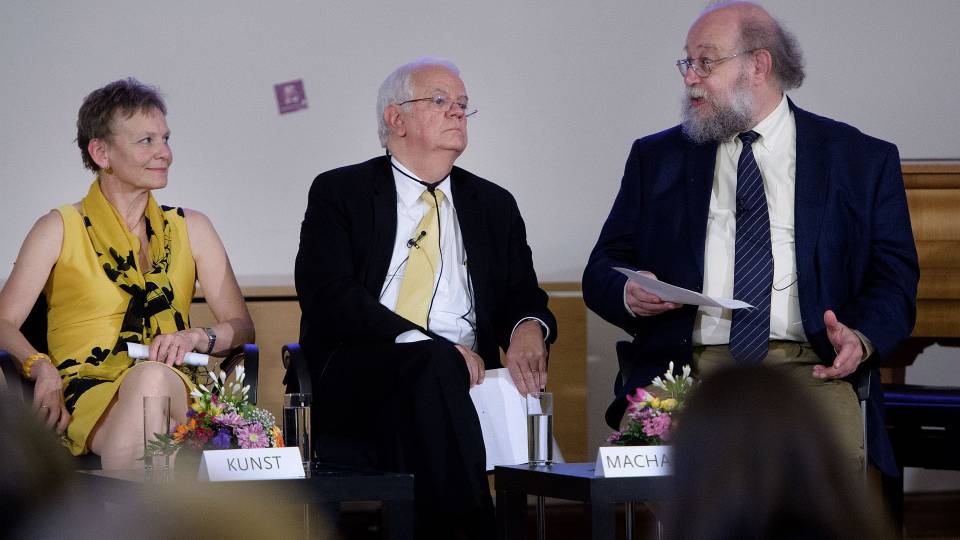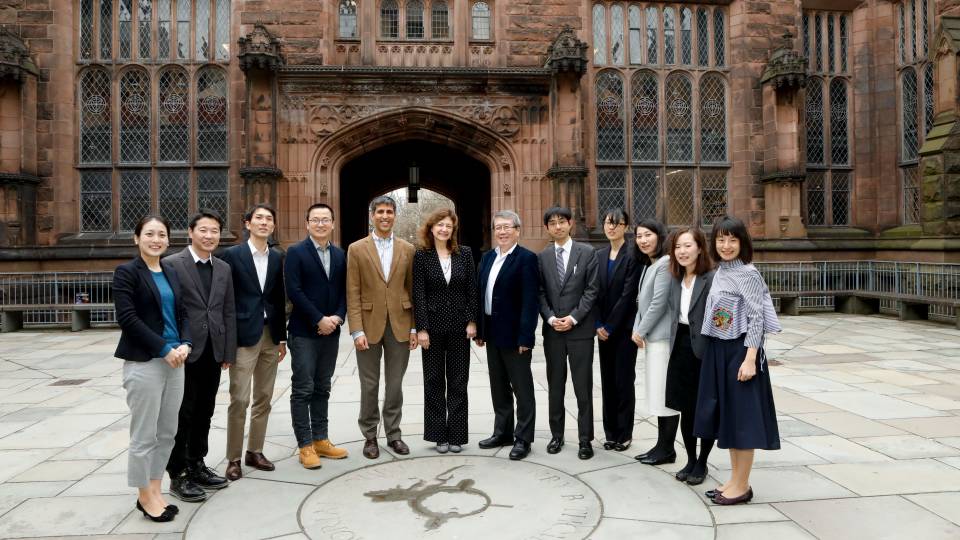Princeton University and the international institutions with which it has strategic partnerships — Humboldt University in Berlin, the University of São Paulo (USP) and the University of Tokyo — have selected the second round of faculty research and teaching collaborations that they will support.
“We always seek initiatives that combine the pursuit of cutting edge ideas with creating opportunities for students and faculty to learn with others abroad,” said Jeremy Adelman(Link is external), director of Princeton’s Council for International Teaching and Research(Link is external) and the Walter Samuel Carpenter III Professor in Spanish Civilization and Culture.
Said Adelman: “The projects, we hope, will yield to more enduring programs. Our hope is that seeding these ventures will allow departments and centers to explore ways to bring new global courses and training infrastructures into their curricula. One prong of our global strategy is for Princeton’s academic units, led by faculty, to enhance their missions by creating means for students and colleagues to cross borders as a central part of what they do.”
The council oversees the strategic partnership grant process, and a committee of faculty members and senior administrators from each pair of universities reviewed the proposals. Grant amounts range from seed grants of approximately $10,000 to three-year grants of up to $300,000 total; the universities split the cost of each project equally.
Summaries of the new projects, which will begin in fall 2014, and their lead faculty members are below. Detailed proposals are available on the council’s website.
Humboldt University
Ancient Knowledge in the Modern University (Anthony Grafton(Link is external), history(Link is external), Princeton, and Philip van der Eijk, classic philosophy, Humboldt). Through two workshops, this group will begin to study the ways in which ancient fields and practices of science and knowledge from the Greco-Roman world changed from being part of their respective disciplines to becoming objects of historical and philological inquiry. Scholars will pay particular attention to the role modern universities and their curricula played in this process since their founding in the 19th century. An interdisciplinary, graduate student-led workshop on translation and the transmission of knowledge will take place at Princeton in the fall, and the second workshop, on ancient knowledge in the modern university, will take place in the spring in Berlin.
Centre for Reality Mining of Animal-Human Systems (Iain Couzin(Link is external), ecology and evolutionary biology(Link is external), Princeton, and Robert Arlinghaus, crop and animal sciences, Humboldt). Couzin and Arlinghaus will establish an interdisciplinary consortium to advance the collection and analysis of data on animal and animal-human social behavior, an innovative and overlooked aspect of wildlife-human interactions. The center’s 10 scholars and research groups — spanning many disciplines from behavioral and theoretical ecology to engineering — will host exchange visits to harmonize ideas and conduct research, such as creating new analytical software and analyzing existing data sets on aquatic and terrestrial systems; hold an international summer school for graduate students and postdocs; and identify research projects that can be incorporated into graduate courses.
Global History Project (Sheldon Garon(Link is external), history(Link is external), Princeton, and Andreas Eckert, Asian and African studies, Humboldt). This project aims to break down national and institutional boundaries in the transnational, interdisciplinary field of global history, building on interest and complementary expertise at Princeton and Humboldt. The project will focus on 1700 to the present, and will offer co-training in global history to graduate students through research seminars for students and faculty; writing studios for doctoral students; student residencies at each institution; joint thesis and dissertation committees; and planned visits and workshops by faculty at each institution. The consortium may also expand through partnerships with other institutions, with funding from additional sources.
Renewable Energy and Mathematical Economics for the Environment (Ronnie Sircar(Link is external), operations research and financial engineering(Link is external), Princeton, and Ulrich Horst, mathematics, Humboldt). This group will launch a student and faculty exchange to develop new mathematical and statistical models related to the transition of energy production in Europe and the United States from fossil fuels to renewable technologies. Researchers will encourage the development of a structured doctoral program by supporting innovative research projects, integrating young researchers into networks at both institutions via research and visits, sponsoring a summer school and conference series, and offering co-supervised Ph.D. projects. This project builds on a series of biennial conferences established in 2007.
University of São Paulo
Computational Design of Sustainable Urban Infrastructure (Sigrid Adriaenssens(Link is external), civil and environmental engineering(Link is external), Princeton, and Ruy Marcelo de Oliveira Pauletti, Polytechnic School, USP). The building sectors in the United States and Brazil account for 40 and 45 percent, respectively, of national energy consumption. To reduce energy consumption and carbon dioxide emissions, this project will investigate form-finding techniques that promote the design of efficient, lightweight structures that use as little material as possible. The seed grant will allow Princeton researchers to travel to USP and a USP faculty member to travel to Princeton to give a short graduate course on these computational methods at each institution. The researchers also intend to collaborate on research proposals, a journal publication and a research presentation at a USP-organized symposium.
Princeton-USP Consortium in Ancient Philosophy (John Cooper(Link is external), philosophy(Link is external), Princeton, and Marco Antonio de Avila Zingano, philosophy, USP). In this project, faculty members and graduate students at both institutions will meet annually for workshops of close textual readings of passages from Plato and Aristotle, with the goal of producing a shared, deeper interpretation of the texts. Graduate students will work in pairs (one from Princeton, one from USP) prior to each workshop to prepare a plan for guiding the collective reading and discussion of a section of the text, and to offer an interpretation of that section. The workshops will serve as both research and instructional tools, and are expected to produce a series of academic papers and books by faculty members and to contribute to graduate students’ papers and dissertations. Funding is for two years, and the consortium hopes to extend the series.
São Paulo as Fluvial Metropolis: Infrastructure, Meta-projects, Imagined Futures and the City as Home (Mario Gandelsonas(Link is external), architecture(Link is external) and Princeton Environmental Institute(Link is external), Princeton, and Alexandre Delijaicov, architecture and urbanisim, USP). In this-three year initiative, researchers will form a research network based on developing an environmental approach to the design of urban water infrastructure in São Paulo. The network will focus on the Waterway Ring Project for São Paulo, a 106-mile network of rivers, reservoirs and an artificial canal intended to re-organize the growth of the city. The network’s activities will include six meetings alternating between Princeton and São Paulo; design-based research studios at each school on the Waterway Ring Project; a new Princeton course on environmental humanities; a new summer internship program in São Paulo and Brazil focused on urban infrastructure and environmental challenges; and two new graduate courses at USP.
Thermoelectrical and Optoelectrical Devices (Claire Gmachl(Link is external), electrical engineering(Link is external), Princeton, and Alain André Quivy, physics, USP). Over the next three years, Gmachl and Quivy will coordinate a number of initiatives to explore the development of new semiconductor devices that can be used in infrared cameras and gas-sensing systems with applications in many industries, from agriculture and public health to defense and energy management. The research groups will share complementary expertise and knowledge through the exchange of two faculty members, two postdocs, six graduate students, and nine undergraduates.
University of Tokyo
Joint Research Training in Pure and Applied Mathematics (Charles Fefferman(Link is external), mathematics(Link is external), Princeton, and Kengo Hirachi, mathematics, Tokyo). To advance research projects and to develop young mathematicians’ skills in communication and collaboration with scholars in other fields, this three-year project will create an exchange for faculty, graduate students and postdoctoral researchers in a variety of fields in pure and applied mathematics. The project also includes a series of joint workshops with participants from both institutions. The project will begin with a focus in five areas — conformal and CR geometry, arithmetic geometry, algebraic geometry, mathematical fluid mechanics, and multiscale analysis for fluid mechanics and materials sciences — with plans to expand as opportunities arise.
Meet the Authors: A Cross Cultural Analysis of Architectural Writings (Jesse Reiser(Link is external), architecture(Link is external), Princeton, and Yusuke Obuchi, architecture and engineering, Tokyo). In this three-year project, the institutions will stage a “Meet the Authors” workshop for students to engage directly with authors of significant writings in architectural discourse in both countries, as many key works have not been translated. The project, which builds on a collaborative studio program started in 2010, will include graduate students, undergraduate students and faculty members. Each summer, each institution will hold a preparatory session and then hold two 10-day sessions together, one in Tokyo, one in Princeton; the topics for the three workshops are urbanism, media and the individual. After three years, the workshops will culminate in an exhibition and symposium to share the participants’ research, with the exhibition traveling to both institutions.
A Tokyo/Princeton Educational Partnership in Plasma Physics (Stewart Prager(Link is external), Princeton Plasma Physics Laboratory(Link is external), Princeton, and Yasushi Ono, energy and frontier sciences, Tokyo). The project will establish a joint educational activity in plasma physics for undergraduate and graduate students, building on 20 years of collaboration between the two institutions. The program will cover lab experiments, plasmas in space and plasmas studied for fusion energy, providing students with experience in experiments, theory and observation. The project’s three components are a summer school of classes and research training, alternating in Princeton and Tokyo, for undergraduate and graduate students; lectures by senior researchers webcast to both institutions and an annual workshop with researchers and students; and graduate student exchanges for dissertation research.
Unlocking the Secrets of Episodic Slow Slip and Tremor (Allan Rubin(Link is external), geosciences(Link is external), Princeton, and Satoshi Ide, earth and planetary science, Tokyo). With this seed grant, researchers in Rubin and Ide’s labs will join forces to study the recently discovered and seemingly correlated phenomena of slow slip — incredibly slow movement of tectonic plates in subduction zones, lasting for weeks — and tectonic tremors — myriad low-frequency earthquakes that can last for hours. They will be sharing data and research methodologies, including numerical modeling. The collaboration will include one-month exchanges by one Princeton graduate student and one University of Tokyo graduate student.


